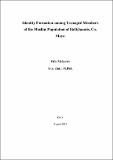| dc.description.abstract | Younger members of Muslim populations in Western society are placed at the frontline of the immigration process. As a result of daily school attendance and exposure to the media they are often heavily influenced by the norms and expectations of the host society. At the same time, they may be expected, by older family and community members, to conform to the social, cultural and religious norms of the country of origin. The process of negotiating an identity which reflects a balance between these differing, and often conflicting, norms and expectations poses a considerable challenge during the formative teenage years.
This study investigates experiences of research participants in negotiating an identity which reflects these often contradictory norms and expectations. Employing a conceptual framework which merges theorisations of identity performance and structuration, this study provides an in-depth examination of the day-to-day lives of research participants. It focuses, in particular, on identity performances within three separate, yet co-existent systems, the home system, the Muslim community system and the wider Irish (majority) system. It locates research participants as agents who actively incorporate the structures of these three systems into their identity performances in order to appropriate their unique position within contemporary Irish society.
I argue that this process is intricate and nuanced for young Muslims. Significant adaptation is often required in order to balance these differing social and cultural expectations. The differentials of gender, social position and age at the time of immigration are highlighted as impacting on the experience of Muslim youth in contemporary Ireland. The accommodation of religious norms and expectations of behaviour while participating in Irish society is also shown to be a particularly complicated process. By investigating the impact of these factors on identity formation, this thesis elucidates the challenging processes through which cultural and social differences are negotiated by Muslim youth in contemporary Irish society. | en_US |


